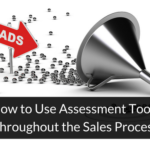We all have to start somewhere when we enter the job market. On the way to learning and earning your sales stripes you probably had a good mentor or two. Along the way you may have also heard some of the worst sales advice known to humankind.
Here are ten pieces of the worst sales advice I have ever received.
1. Slam the Competition
Early in my sales career, I was in a heated battle with a competitor that was gaining market share. During my presentation, I focused my discussion on how my product compared to that competitor. When all was said and done, I lost that sale.
The client stated, “You focused too much on your competitor and not on what you could do for our practice.”
By focusing on my competitor, I overlooked the capabilities of my product and more importantly, the needs of the client.
2. Only Talk about Yourself
This doesn’t work at cocktail parties, why would it for sales? Talking about yourself and your product instead of engaging with the customer to determine the problem to be solved and how value is determined, is just talking into a megaphone.
By the time you are done, the customer is completely disengaged and ready to have a conversation…with someone else who knows her better. Clients don’t care about you. They care about themselves and solving their business challenges.
3. Rely On a Personal Relationship to Close the Deal
It’s nice the customer likes you, but that doesn’t automatically solve the business challenge at hand. If you get too focused on selling and making your numbers, you will miss the clues that tell you your job is not done yet.
4. Assume the Deal Is Closed
It’s not over until it’s over.
Just because you have provided a demonstration of your product doesn’t mean your job is done. The deal is closed when the customer signs, not before. Focus on the sale all the way to the end or it could slip out of your hands while you are resting prematurely on your laurels.
You know what they say about assume.
5. Treat All Your Prospects the Same Way
Prospects are people and people are different. Therefore, prospects are different.
They have different problems, they need different solutions, and they are at different stages in the sales cycle. Your pitch and your solution must be tailored to a prospect’s specific needs. It is your job to show how your solution fits those needs best.
6. The Product Will Sell Itself
If the product could sell itself, you wouldn’t need to be there, right? So this statement simply isn’t true.
Even if you have the best product on the market, it may look attractive to your prospect but it is your job to make them desire it. Everyone needs some incentive, especially when the future of their career can be hampered with a poorly made purchase decision.
7. The Bait and Switch
How do you feel when you respond to an ad about the perfect item at the perfect price, only to be told it isn’t available? BUT you can buy this other (more expensive) item since you are here.
Here are some examples of bait and switch tactics used all the time:
- A car dealership offers a “one-of-a-kind” low price vehicle that is in limited supply.
- Ads offering a free product “While supplies last,” from a store hoping to increase traffic.
- The item pictured in the ad is not the one on sale.
- Financing offers low, low rates that almost everyone is eligible for. In actuality, you would need perfect credit to get the deal.
By the way, bait and switch is considered to be fraud; yeah, it’s illegal.
8. Just Give a Demo
This is related to “The product will sell itself.”
If you give a demonstration of your product or service without any preliminary discovery or discussion of the customer’s problem or needs, you are performing a futile exercise. You can’t predict questions so you can’t prepare answers and you definitely won’t know the best way to approach your client.
In fact, you won’t know your client at all. How will you be able to sell on value when you don’t know what is valued?
9. Copy the Top Salesperson
You can certainly watch the top salespeople in your company to pick up tips, but you shouldn’t copy them exactly. You will be selling to someone different, with different problems, and possibly at a different place in the sales cycle.
A good salesperson doesn’t use a script. The sale must be customized to each prospect to be successful.
10. Don’t Leave a Voicemail
If you call and don’t leave a message, how can you count that as a contact? The customer won’t know you tried to connect.
Leave a succinct voicemail that tells the client you understand the problem and can solve it. Be brief, be specific, and let the customer know you will try again.
That’s a lot of bad advice, often given by those who don’t really know what a sales person’s job is.
What is the worst sales advice you’ve ever received? Sound off in the comments!















